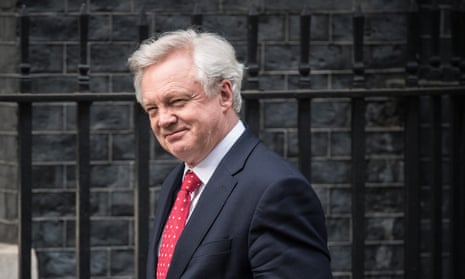David Davis has rejected suggestions that the UK will have to pay a €100bn (£84.5bn) bill to leave the European Union, saying rising estimates of the divorce bill prove that no deal is better than a bad deal.
“We will not be paying €100bn,” the Brexit secretary told ITV’s Good Morning Britain.
It had been estimated that Brussels was seeking up to €60bn to allow the UK to leave the bloc, but added demands by the EU could put the final settlement at €100bn, according to the Financial Times.
Speaking later to BBC Radio 4’s Today programme, Davis dismissed the figure as part of the “rough and tumble” of negotiations.
His comments came as Michel Barnier, the EU’s chief Brexit negotiator, was about to hold a press conference in Brussels outlining the details of the EU’s negotiating position.
Davis said: “Our intention is to get an agreement; we have to maintain the alternative option. That’s why Theresa [May] said no deal is better than a bad deal. This morning you see demands for €100bn in the papers. It has gone from €50bn, to €60bn to €100bn. It rather actually proves her point. I know that is not where we will end up. The simple truth is this is going to be a tough negotiation.”
Davis cited the example of Margaret Thatcher’s negotiations with European leaders. “When Mrs Thatcher walked away she got the rebate. We have a €290bn market for them. Once we are outside we will be their biggest external market. That’s incredibly important to them ...
“In the walkaway circumstance there is nothing to pay. But nobody is looking for that outcome. We want a deal. We think we can get a deal.”
He added: “You’ve seen in the mixture of gossip and spin in the last week. The British public should look at everything that comes out with a pinch of salt. This is first part where we will have this slight rough and tumble approach.”
Davis dismissed a suggestion by Barnier that the European courts could arbitrate on the final divorce bill.
He said: “We don’t agree with that. These are negotiating demands that are being lined up. And we will make our counters to them. That’s not something that we see as being either necessary or valuable.”
Davis, who will be leading the Brexit negotiations, insisted he could do a deal with Barnier. “I’ve dealt with Michel Barnier many years ago. You will never hear a word of criticism of him from me. He’s tough, he’s straightforward, he’s French, he’s very elegant. He’s determined, but he’s also done deals in the past.”
He added: “We have said we will obey our legal obligations but they are not going to be determined for us by one side or the other; it will be a matter of negotiation.”
Later, speaking at a Conservative party election press conference, Davis dismissed suggestions May will not be directly involved in negotiations with Brussels. “We’re not entering this negotiation as supplicants; it’s not for the other side to lay down every single rule, and within the laws and rules of the European Union, we are a full member until we leave.”
He said: “The prime minister is a member of the [European] Council, so she will be seeing the people who are going to make the eventual decision on a monthly basis, or more. Similarly, we will decide the structure of our negotiating team, not the European Union”.
Asked about reports confusion in Brussels over whether Davis himself, or Oliver Robbins, the permanent secretary at the Brexit department, will attend regular negotiating meetings with Barnier, Davis said, “the principal dealing with Michel Barnier will be me; but of course Ollie will be involved as well.”
Leaks revealed a tense dinner took place last week at Downing Street between May and European commission president, Jean-Claude Juncker. May’s demands that the trade talks should occur before a divorce bill had been agreed were met with incredulity, according to the leaks.
The chancellor, Philip Hammond, also speaking at the Conservative election event said: “What this episode shows is just how tough this negotiation is going to be, and the question people have got to ask themselves as they go into the polling booth on June 8th is, who do they want conducting these negotiations for Britain - Theresa May, or Jeremy Corbyn? Who is most likely to get the best deal for Britain?”
Asked about the potential size of the exit bill, the chancellor said: “We are on the brink of a very tough, complex, lengthy negotiation, and I am not remotely surprised that people are manoeuvring for opening advantage in that negotiation.”
On Tuesday May declared that she would be a “bloody difficult woman” in the talks. The prime minister told the BBC: “During the Conservative party leadership campaign I was described by one of my colleagues as a bloody difficult woman. And I said at the time the next person to find that out will be Jean-Claude Juncker.”
